A Guesstimation of a Booklist Review-type Post
I alluded to this in an earlier post, but the main reason Three Percent has been light on this sort of content (and heavy on BTBA content, which is all stellar and worth checking out) isn’t due to a lack of desire or interest, but a confluence of other events: deadlines for two pieces (one that should be available shortly, the other which is quite long), and a new project judging a translation award (I’ll write a bit more about this at the end of May). All of this took up the spare nighttime hours I use for reading books for this ongoing series of posts.
Before moving on to the month of May—which is going to be all about graphic novels in translation—I wanted to at least squeeze in a couple final posts . . .
Granted, neither of these will appear in April, but whatever. Time is “Jeremy Bearimy” or something like that. I do want to run through a bunch of nonfiction books in translation I had hoped to read this month (see silly premise below), but also, I want to post a long update on the International Writers Hall of Fame idea. So submit your nominations NOW. I’m going to write this Thursday night and will compile all names submitted to date and share some observations, a new poll, ideas for how to process all this, etc.
(And yes, at some point I’ll pick back up with Marie-Claire Blais and more Anniversary posts. Summer is almost here, and although I need a bit of a break to read for enjoyment, I am still chugging along and want to share a lot of ideas I’ve had as I’ve been reading these two major authors.)
But today? Let’s play a game called “What Chad Would’ve Said About This Book.” (Semi-indebted to Toby Carroll’s “Watchlist” column for this. Except that he’s actually earnestly talking about the books, and well, yeah.)
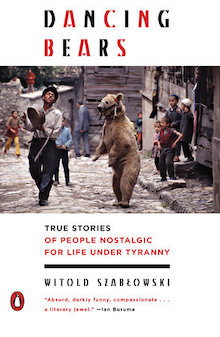
Dancing Bears: True Stories of People Nostalgic for Life Under Tyranny by Witold Szabłowski, translated from the Polish by Antonia Lloyd-Jones (Penguin)
For hundreds of years, Bulgarian Gypsies trained bears to dance, welcoming them into their families and taking them on the road to perform. In the early 2000s, with the fall of Communism, they were forced to release the bears into a wildlife refuge. But even today, whenever the bears see a human, they still get up on their hind legs to dance.
In the tradition of Ryszard Kapuściński, award-winning Polish journalist Witold Szabłowski uncovers remarkable stories of people throughout Eastern Europe and in Cuba who, like Bulgaria’s dancing bears, are now free but who seem nostalgic for the time when they were not. His on-the-ground reporting—of smuggling a car into Ukraine, hitchhiking through Kosovo as it declares independence, arguing with Stalin-adoring tour guides at the Stalin Museum, sleeping in London’s Victoria Station alongside a homeless woman from Poland, and giving taxi rides to Cubans fearing for the life of Fidel Castro—provides a fascinating portrait of social and economic upheaval and a lesson in the challenges of freedom and the seductions of authoritarian rule.
Chad’s Take: I actually read this one! Well . . . most of it. I was diligently reading it right up until I interviewed Antonia and Sean Bye about Polish reportage. We talked about the book quite a bit on there, and I do think that it’s a great example of reportage in its structure. The first part is about the “dancing bears” forced into freedom after Bulgaria joins the European Union. Bears who, to some, display certain characteristics that make it seem like they long for the olden days of performing for money and attention. Szabłowski presents this not from a top-down, opinionated point-of-view, but through the voices of a number of different people involved, from former bear trainers to the workers at the giant park (funded by taxpayers) that takes care of the freed bears.
Those elements are added to and subverted in the second half of the book—a series of profiles of people from around the world who aren’t adjusting all that well to the fall of communism. (This is the part that I “mostly” read, to be honest. Not because it wasn’t good, but because I had already done the interview and figured that my “analysis” for this post would inevitably be incomplete and wacky no matter how many pages I got through.) I think this book is a fantastic introduction to Polish reportage in the way it gets its point across by placing certain voices and perspectives alongside one another, rather than starting from a thesis that is presented as fact (yet is definitely opinion) and backed up by example after example throughout. There’s something more humble and invigorating about good reportage compared to what we usually think of “journalism” or writings on “current affairs.”
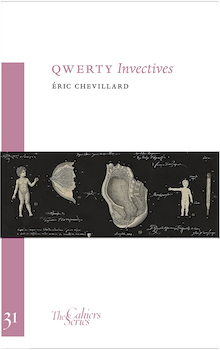
QWERTY Invectives by Éric Chevillard, translated from the French by Peter Behrman de Sinéty (Sylph Editions)
Using the first letters of the keyboard as his guide, Éric Chevillard assembles here an eclectic medley of reflections and autobiographical experiences. Yet his attempt to subject content to the formal order of a French keyboard is twice undermined: through its translation into English, and by the nature of the texts themselves, which demonstrate insistently the power exercised by disorder over writing. Chevillard addresses important yet disparate topics: the experience of turning fifty years old, water closets, enemies, returns, and eyes. Complemented with drawings and engravings by the great French etcher Philippe Favier, QWERTY Invectives is a humorous little cahier that delights and enchants as Chevillard wanders along his keyboard.
Chad’s Take: I think I’m going to take this with me to NY this weekend . . . Seems like the perfect little pamphlet for two seven-hour train rides . . . Chevillard seems to be coming back into style (like that gum you like?). Over the past year, I’ve seen a number of booksellers discover him on Twitter, which is great! I remember reading him back in the early 2000s at the urging of Warren Motte. Back when the University of Nebraska was kicking translation ass. (Do they do anything anymore? Three books in 2018 . . . including one I wrote about!) (Is “kicking translation ass” the proper phrasing? Doesn’t “kicking ass at translation” make more sense? Or less? Can the incorporeal ass of a process even be kicked?) Everyone should read Warren Motte’s Fables of the Novel: French Fiction Since 1990 for the Chevillard chapter and the ones on Linda Lê, Marie NDiaye, Jean-Philippe Toussaint, Christian Oster, and, well, everyone else. What a murderer’s row of amazing French writers! I think that working on this book gave me a weird jaded sense of things . . . All of these authors feel so old to me now, but their voices are (mostly) still fresh and relevant, and why wouldn’t readers just finally come to appreciate them now, sixteen years later? (Sixteen years ago, I didn’t even have children. What have I done this year? It’s already May.) Also: this is the thirty-first book in Sylph’s Cahiers series. Talk of murderer’s row? (Which, like the ass of the kicked translation, is a phrase that will never not be weird . . . where are these murderer’s all lined up and why?) Scroll down this page for some of the most interesting world writers of our time writing about interesting topics related to international literature/translation. Anne Carson. Lydia Davis on Proust and Blanchot. Richard Pevear on “Translating Music.” God DAMN. I have most of these as well, yet . . . in the end I’m a bad reader. (What have I done this year?) OK, let’s rectify this: One of the pre-ALTA months will be a deep dive into every Cahier that’s been published. We can do this.
Also: I love the term QWERTY and couldn’t give two fucks about how this particular keyboard layout is “inefficient.” Sure, that’s probably because I learned to type on this and can type quite fast—and fairly accurately—but also, it’s nice to have a bit of inefficiency built into the human-machine interface.
And why is Motte’s Fables of the Novel available on Amazon, but not listed on Dalkey’s site? John Kulka: See this post and email me. I can’t figure out how to reach you, but we need to talk.
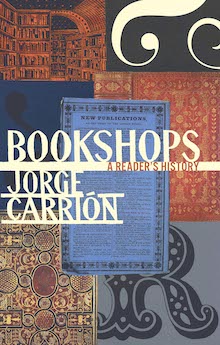
Bookshops: A Reader’s History by Jorge Carrión, translated from the Spanish by Peter Bush (Biblioasis)
Jorge Carrión collects bookshops: from Gotham Book Mart and the Strand Bookstore in New York City to City Lights Bookshop and Green Apple Books in San Francisco and all the bright spots in between (Prairie Lights, Tattered Cover, and countless others). In this thought-provoking, vivid, and entertaining essay, Carrión meditates on the importance of the bookshop as a cultural and intellectual space. Filled with anecdotes from the histories of some of the famous (and not-so-famous) shops he visits on his travels, thoughtful considerations of challenges faced by bookstores, and fascinating digressions on their political and social impact, Bookshops is both a manifesto and a love letter to these spaces that transform readers’ lives.
Chad’s Take: So, I used Carrión’s “Against Amazon: Seven Arguments, One Manifesto” in my class this spring as part of the “Amazon is the Greatest! / Fuck Amazon” week of lectures in which I roller-coaster the shit out of my students in a way that’s all business and logic at first, all emotion and culture at the end. There are about four classes a semester that I know I can nail and those are two of them. (The Lost class is another. And that comes at the very end of the semester. I’m surprised students don’t lose patience with me—all the best material is bunched up, when it should be evenly distributed!) Next semester, I’m assigning this book as a whole. I’ve never read it, but it’s Spanish and about bookstores, and clearly less academic than Reluctant Capitalists: Bookselling and the Culture of Consumption, which I’ve been forcing students to buy for years. (You’re welcome, University of Chicago.) Do you have any idea how hard it is to teach about the values of a bookshop to eighteen-year-olds who maybe have been in an indie store a few times in their lives? It’s not impossible and there are beats one can hit, but that nostalgia you probably feel at the idea of visiting a random town, finding their local bookstore, spending a few hours perusing the stacks (even the word “perusing” is nostalgia-inducing, “I’d like to go out perusing for a while,” yes please thank you very much), checking out the local staff picks, trying to find a book you haven’t seen or heard of that sounds interesting. I can write and talk and teach against nostalgia (see: every comment I’ve ever made about Twin Peaks: The Return), but I do love it at times. Also, Biblioasis is amazing and someday I hope to convince Dan to publish one of the books I write. This July I’m going to work on a new little project that will interest anyone who’s read this far in this post, but will likely never work for a serious press or a wider readership. And will end up being an Amazon ebook just like the Three Percent Problem: Rants and Responses and All the Rest of This Incredibly Long and Self-Indulgent and Quasi-Academic Title. Which is ironic!
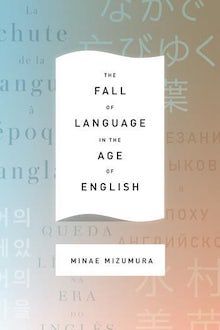
The Fall of Language in the Age of English by Minae Mizumura, translated from the Japanese by Mari Yoshihara and Juliet Winters Carpenter (Columbia University Press)
Winner of the Kobayashi Hideo Award, The Fall of Language in the Age of English lays bare the struggle to retain the brilliance of one’s own language in this period of English-language dominance. Born in Tokyo but raised and educated in the United States, Minae Mizumura acknowledges the value of a universal language in the pursuit of knowledge yet also embraces the different ways of understanding offered by multiple tongues. She warns against losing this precious diversity.
Universal languages have always played a pivotal role in advancing human societies, Mizumura shows, but in the globalized world of the Internet, English is fast becoming the sole common language of humanity. The process is unstoppable, and striving for total language equality is delusional—and yet, particular kinds of knowledge can be gained only through writings in specific languages.
Mizumura calls these writings “texts” and their ultimate form “literature.” Only through literature and, more fundamentally, through the diverse languages that give birth to a variety of literatures, can we nurture and enrich humanity. Incorporating her own experiences as a writer and a lover of language and embedding a parallel history of Japanese, Mizumura offers an intimate look at the phenomena of individual and national expression.
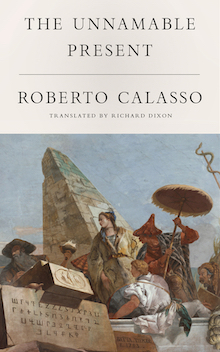
The ninth part of Roberto Calasso’s work in progress, The Unnamable Present, is closely connected with themes of the first book, The Ruin of Kasch (originally published in 1983, and recently reissued by FSG in a new translation). But while Kasch is an enlightened exploration of modernity, The Unnamable Present propels us into the twenty first century.
Tourists, terrorists, secularists, fundamentalists, hackers, transhumanists, algorithmicians: these are all tribes that inhabit the unnamable present and act on its nervous system. This is a world that seems to have no living past, but was foreshadowed in the period between 1933 and 1945, when everything appeared bent on self-annihilation. The Unnamable Present is a meditation on the obscure and ubiquitous process of transformation happening today in all societies, which makes so many previous names either inadequate or misleading or a parody of what they used to mean.
Chad’s Take: The one thing I remember from when this book came in to the office is that it was describing the present situation of the world, which intrigued me because Calasso is really old and generally associated with things like “ancient history.” I know that seems dismissive, but to be honest, the older I am, the more refined my revolution. In my 20s, I knew best and needed to overthrow the world. My 30s were about figuring out how to make it by, because kids and a desire to not look like I’m poor. (I don’t want to look poor anymore . . . but I do because choice and bad taste.) And now, my 40s are like, “shit is complicated.” By no means have I become more conservative—if anything, the opposite—which is why I like being around younger people. But that reminds me, in tangential ways (is there an emoji for “this post is a tangent”?) that my main argument with the new redesign of LitHub isn’t the 2,000 menu options, or the “podcasts are cool? Let’s do 700 podcasts!,” but the fact that so many lists and articles just don’t entertain me. Because I’m not their audience. At what point in the aging curve can you say, “that neither entertains me nor makes me feel smarter” and just walk away without anyone being offended? Because that’s what it really is. My “hate” of Buzz-Hub is simply that they aren’t for me. But they are for a lot of 22-28 year olds. Good! Embrace that. It’s not the absolute of knowledge and judgement that it plays at (proof? these sites still treat Game of Thrones like high art), but it’s respectable. Be smart and entertaining. That’s what I tell my students. Forget AP Style and Chicago and all that. Bring me a voice that makes me laugh and think and wonder and enjoy the words more than the list. Style over numerology, all day, ‘er day. (What month is it? I haven’t done shit this year.)
*
Generally, I don’t explain any of these posts or the dumb games that I play while trying to write them, but although I mostly got into it above, I feel like maybe there is a good reason to in this case. When I decided in March that I wanted to spend a month reading and writing about nonfiction in translation, I immediately picked out all of the books listed above. Why these ones instead of the, literally, hundreds of other options in the database? I’m not sure . . . Which made me curious. None of these books were marketed in a way that would specifically appeal to me, and I’m 99% sure I never read a single review or tweet about any one of these titles. So what drew me to these particular ones? My thought—as I started thinking about this post—is that there is a network of unarticulated feelings, resonances, intellectual interests, and the like that are activated by the mere existence of a book or movie or album or whatever. My little experiment above was to eliminate all the usual explanations for liking a book—or wanting to read it—and instead to let my mind wander and see if I could capture the random subconscious leanings that draw me to particular things. I don’t think this was entirely successful, but it truly is a hodgepodge (again, what is the origin of this term?) of references, including song lyrics, Pynchon things that are in my mind thanks to Against the Day, and whatever else. But strangely, in the end, I think all this post accomplished is to make me absolutely want to read all of these books, even more so than before.

Leave a Reply